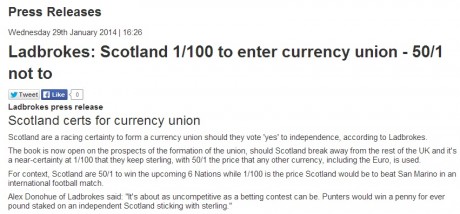Its a call for Salmond to come up with a Plan B on his currency proposal of using the pound.
He, from his depths of expertise and experience, sees absolute disaster for our economy if Salmond doesn't come up with a Plan B.
http://policyscotland.gla.ac.uk/viable-plan-b/If Scotland were to become independent it may inherit a proportion of the UK’s national debt although even if it had not, it would still have to issue debt to finance its fiscal deficit, which would most likely be in the region of 5-6% of GDP post independence. That debt has to be sold on open financial markets. Again it is now widely accepted that an independent Scotland would incur a premium on its debt (i.e. a higher interest rate), which is simply in the nature of small countries with shallow capital markets, especially new ones. This premium would be determined by financial markets but is likely to be in the region of 1 – 2% above what HMT would have to pay on similar UK debt.
However, the 1-2% premium is predicated on an independent Scotland having a credible currency arrangement and, indeed, wider macroeconomic framework in place. As things stand at the moment, the proposed currency system is not credible and international capital markets would require such a huge premium on and independent Scotland’s debt that its deficit would be unsustainable and the Scottish Government would be forced to make significant cuts to public expenditure, or raise taxes or both and abandon its exchange rate policy at huge cost to the Scottish economy.
Of course, even before the first day of independence individuals and business would have an 18 month transition period to move capital out of the Scottish economy if there are clear uncertainties arising from its currency policy. Attempts by, for example, key elements of the Scottish Financial sector to locate some (perhaps in proportion to its trade with rUK) or all of its business south of the border, could have massively profound effects on the Scottish economy in terms of employment and output.
So with no well thought through plan B in place the outcome of a Yes vote would produce a very uncertain time for the Scottish economy, with likely massive disruption to employment and output which would be generational in its impact, just as in the case of previous economic mismanagement of UK exchange rate policy.
Their also seems to be an important misperception in the recent White Paper, and in statements by prominent figures in the SNP, that the UK would have to sign up to a sterling zone arrangement because the balance of payments consequences of not doing so would be unpalatable for rUK. However, it is widely accepted that sterling is currently overvalued. Much of this comes from the effect of North Sea oil revenues on the UK balance of payments. Freeing the UK from this burden would make the UK much more competitive but have the opposite effect on the Scottish economy. This is surely not a very good bargaining position for the Scottish government?
Without a plan B, then, on the currency issue the Scottish public are effectively being duped about the potential massive costs and disruption to the Scottish economy.
No doubt the nationalists will dismiss this as the outpourings of a Unionist lackey.....come on; he's The Adam Smith Professor of Political Economy at Glasgow University; he has one of the highest academic reputations in the land to protect. He is not going to deliberately publish bilge.
Why don't the nationalists listen ?
Why do they try to shout down the slightest criticism ?
Its ours, our childrens' and our grandchildrens' futures being threatened by Salmond's personal ambitions.
